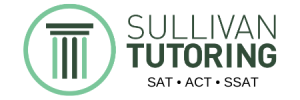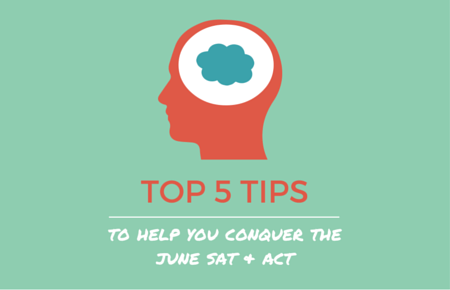By Scott Sullivan
President and Founder, Sullivan Tutoring
and Becky Squibb
Director of English, Sullivan Tutoring
The June SAT and ACT are quickly approaching! As you prepare, check out our top 5 tips that’ll get you through test day.
-
Look out for trap answers in the Reading Section
When answering questions about the reading passages, be sure to avoid TRAPS! Trap answers include: partially correct answers, logical arguments & assumptions, and outside knowledge. Partially correct answers are answers that are mostly true, except for a word or two; make sure to choose an answer option that works completely, totally, 100%. Logical arguments are answer options that require you to reason your way to an answer—of course answers are supposed to be reasonable, but they should not take a billion steps to get to. Additionally, the correct answer will not require assumptions to be made about a character or event. An inference is different than an assumption. Lastly, make sure you are not relying on outside knowledge, especially on any science or history passages. All correct answers will be passage-based, even if you might have prior knowledge about the topic at hand.
-
Use “Plan B” strategies for math
On both the SAT and ACT math, remember to use the following two Plan B strategies, as they can be game-changers:
• Throwing in numbers for variables
• Plugging in the answers
When throwing in numbers, make sure they work with what is given in the question. Also look to use numbers that make your life easier (like using 100 on a percent question).
When plugging in the answers, look to start with middle answer options first or with easier answer options first (like those containing integers and non-fractions).
-
Write a long essay
The SAT essay is 50 minutes long and the ACT essay is 40 minutes long. Use every minute to your advantage. Longer essays typically score higher, so keep on writing for the entirety of the allotted time. If you write your essay conclusion, but still have some time left, you should add to your body paragraphs by utilizing an asterisk (*) and adding a corresponding endnote.
-
Bring snacks
This may seem like a silly tip, but our brains work better when fueled. Scientific studies have shown that humans need food in order for their brains to function properly—and a properly functioning brain is of utmost importance on test day. You will receive short breaks throughout the testing period, so it is an excellent idea to use that time for re-charging your brain with some healthy snacks. As you pack up your ID, calculator, admission ticket, and pencils for test day, remember to include something like a granola bar, yogurt, or a sandwich to snack on.
-
Answer everything
Pacing yourself is important, especially on the ACT (which is a bit faster-paced than the SAT). This means that you should not dwell on a question that seems to be taking up a lot of your time. If a question is absolutely stumping you, try to eliminate a couple answer options, choose an answer, and then move on to the rest of the questions. Don’t waste precious time on one question that you could be using to answer a bunch of other ones. Additionally, if you see that time is running out, do not leave any questions unanswered. Bubble-in your answer sheet instead of leaving it blank. A 25% shot at choosing the correct answer is certainly better than a 0% chance of receiving a point!
Finally, just remember to relax. You’ve got this!

